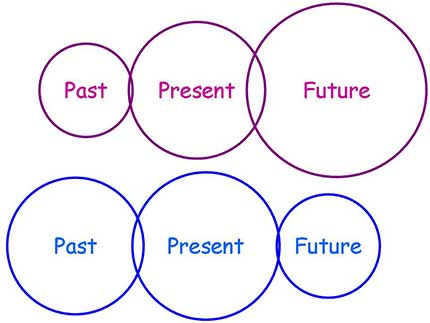Perspectives on time management
Have you ever wondered why some people are always late for meetings or why some people get upset when you are late but others don’t worry too much?
The chances are you are dealing with people who see time differently. For some, time flows from the future into the present and on to the past at a steady rate; our plans for tomorrow become the actions of today and then the memories of times past. Others see time as a river carrying them forward to an uncertain future.
While everyone is aware of the three elements of time—the past, the present and the future—different cultures see these three aspects of time in different ways. From a physical perspective, time flows from the future into the present and onto the past at the steady rate of 60 minutes every hour for all of us (unless you want to bring quantum physics and relativity into the discussion) but this does not mean everyone focuses on the three elements of time in the same way.
Western European cultures, including Australia and North America tend to have a strong future focus: what’s happening in the present is focused on securing a good future outcome. The past is relatively unimportant (‘you can’t change history’).
Cultures with a present focus let go of the past, don’t worry about the future and fully enjoy the experience of the present. This focus can be a wonderfully relaxing experience as anyone who has practiced yoga or meditation knows, but it can also lead to the need for immediate gratification and short-term payoffs, traits of many youth cultures.
Some more traditional societies, for example, those found in Africa, Asia and southern Europe, tend to have a past focus. These cultures are grounded on the past, what we are today is the result of the work of previous generations. Consequently they are focused on preserving their history, respecting family and society elders. For them, the present is a continuation of the past and there’s not much point in doing too much planning for an uncertain future. In these societies, the Western view of time as a strictly linear function of seconds, minutes, hours, days is seen as very restrictive and limiting.
Being aware of these different perspectives can help you understand why different people manage time differently. For example, someone with a strong present focus, anchored by the past will consider their current discussion or other activity they are engaged in as important. They value their current interaction with a respected colleague and would find it inappropriate to cut that time short simply to be ‘on time’ for a future meeting. If that meeting is organised by a forward looking person with a strong time focus, there will be problems.
The circle test
One way to appreciate where you and your team members are in the ‘time warp’ is to use Tom Cottle’s Circle Test. To use the test, grab a sheet of paper and think of the past, present and future, each being represented by a circle. Draw the three circles on the page, arranging the circles in the way that best shows how you feel about the relationship between the past, present and future. Use different size circles to indicate relative importance and separate or overlap the circles depending on how much influence each one has on the others. When you have finished, label each circle to show which one is the past, which one the present and which one the future.
The ‘purple circles’ represent a strong future focus with the present feeding into achieving future outcomes: there is little connection to the past. This may be typical for a lot of time conscious ‘western’ project mangers.
The blue circles show a strong present focus firmly grounded in past experiences and traditions. The present is a bit more important than the past but the future is not really connected to the present and of lesser importance. Don’t expect someone from this culture to be on time for meetings!
The western project management focus on time can be effective but can also be dangerous. The stress of missing an impending deadline can affect people’s health, cause them to sacrifice their relationships and lead to short cuts in quality and missed opportunities. Is it really worth destroying value by de-scoping a project just to achieve a deadline (especially if it’s artificial)?
A more balanced view may mean the ‘deadline is missed’ but may also mean there are opportunities to deliver 100 percent of the scope, identify additional hidden value, and maintain a healthier and happier project team. The optimum answer depends on the circumstances of the project and the time focus of key stakeholders.
Cultural diversity is to be encouraged, but if you want the best out of your diverse team everyone needs to embrace the opportunities different views of ‘time’ can bring to your work. Continually pushing forward to achieve artificial deadlines can destroy opportunities for reflective learning and value creating insights, but these opportunities needed to be balanced with the need to ‘get things done’.


